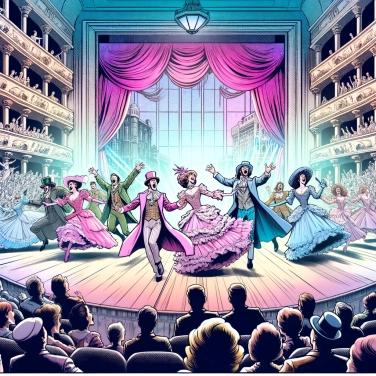Musical comedies are popular on stage because they offer a unique blend of artistic elements such as music, dance, and theater, creating an immersive experience for the audience, and are often based on captivating stories that evoke strong emotions.

In a musical, songs often serve to express deep emotions, those that are not easily conveyed through simple speech. Dance, on the other hand, makes these emotions visible, with movements that amplify or follow what the lyrics describe. Add to this a dramatic narration, a gripping story that evolves between each piece, and you get a complete performance, where each element enriches the others. This fusion allows for a special level of immersion: we directly feel the characters' emotions and understand their journey effortlessly. It’s as if the artists invite the audience directly into their universe, unfiltered, through these three combined forms of expression.
Musicals offer the audience a rich and colorful visual universe. Through spectacular sets, spectators are easily transported to imaginary places or historical eras. The costumes, often extravagant and detailed, help to instantly immerse the audience in the atmosphere. Additionally, there is an inventive use of lighting effects to amplify emotions and moods. Not to mention the dynamic and perfectly coordinated choreography that makes the stage experience incredibly vibrant. This immersive visual blend explains why it captivates the eyes, whether one is a fan of the genre or not.
In a musical, the songs evoke a direct and powerful emotion, without going through long dialogues. It’s a simple and quick way to capture the audience, allowing them to immediately feel what the character is experiencing: sadness, joy, anger, hope. The music further amplifies this sensation, speaking directly to our senses. It creates a unique feeling of being in immediate connection, having direct access to what a character feels through the melodies. It leaves a lasting impression, in a way that simple dialogues can rarely match. We often leave feeling touched, sometimes even shaken; remember the songs that stay in our heads long after a show, which is precisely due to the incredibly strong emotional link that a good musical provides.
Musicals are filled with characters that we can easily identify with, because they go through basic life experiences: love, dreams to achieve, rivalries, or even self-overcoming. For example, everyone knows Maria and Tony from West Side Story, because their story is ultimately "Romeo and Juliet" in an urban and modern setting. Or take Jean Valjean from Les Misérables; this guy resonates with people because he represents the eternal struggle between forgiveness, justice, and redemption, universal themes that speak to everyone. These characters stick in our memory because they embody true, authentic feelings that anyone can experience regardless of the time or place.
Musicals have a lasting impact on our popular culture. Classics like West Side Story or Les Misérables have been performed for decades around the world, proving that these works continue to resonate with new generations. Some melodies or songs are so iconic that they achieve cultural icon status, being featured on television, in movies, or even in video games. Through their adaptations, tributes, and constant references, these shows profoundly influence the way we tell stories today. Ultimately, musicals leave a strong imprint on our collective imagination.
The musical 'Hamilton' by Lin-Manuel Miranda is entirely sung or rapped, with no traditional spoken dialogue. Its album received a Pulitzer Prize, making it one of the few works in the genre to receive this prestigious distinction.
The term 'Broadway' refers not only to a famous avenue in New York but also to a specific criterion: to be considered a 'Broadway' production, a musical must have more than 500 seats available in the theater.
The American expression "Break a leg," commonly used to wish actors good luck before a performance, is believed to have historical origins related to the audience standing in applause, with the term "leg" also referring to a side angle of the stage.
The famous composing duo Rodgers and Hammerstein, creators of classics like 'The Sound of Music,' collectively won 34 Tony Awards and 15 Oscars for their theatrical and cinematic works.
The price of tickets varies greatly depending on the popularity of the show, the venue, the date, and the seating arrangement. Generally, prices range from a few dozen euros for less well-known performances or economy seats, to several hundred euros for highly popular shows or premium seating.
Although both involve music and stories told on stage, operas generally prioritize continuous lyrical singing and rarely use spoken dialogue. Musicals often incorporate spoken dialogue, more accessible popular music, and elaborate choreography.
Yes, it is generally possible to enjoy a musical without understanding the language used, thanks to the power of the emotions conveyed through physical performances, dance, and visual staging. However, understanding the lyrics provides an additional experience by deepening the connection with the story and the characters.
Yes, many musicals adapted for children or the whole family exist. Shows like 'The Lion King', 'Aladdin', or 'Frozen' have been specifically designed to delight audiences of all ages, combining playful storytelling, spectacular visuals, and catchy songs.
A successful musical generally combines a well-structured story with engaging characters, memorable music, catchy choreography, and impressive set design. The emotional connection with the audience, a talented cast, and effective promotion also contribute significantly to the success of a musical show.

0% of respondents passed this quiz completely!
Question 1/5